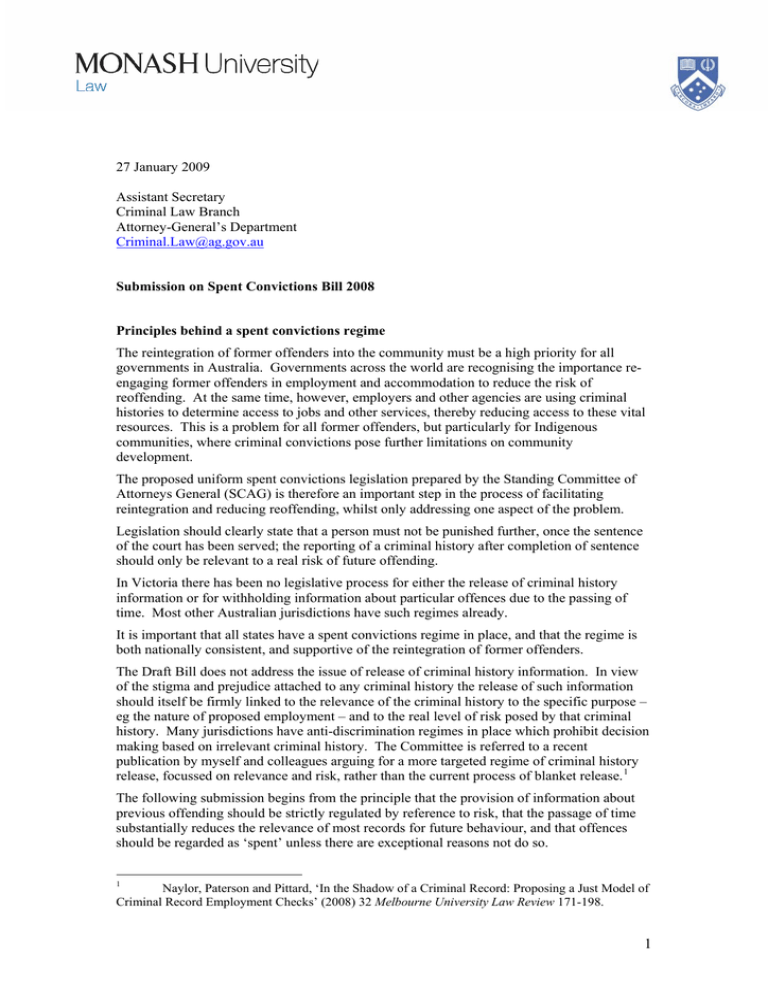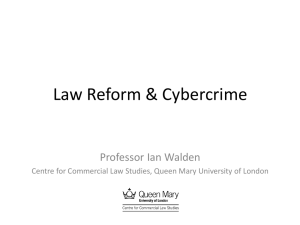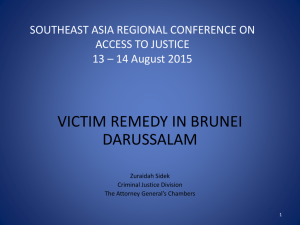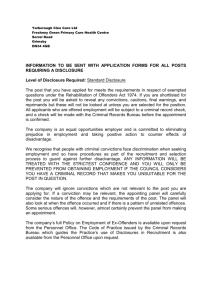
27 January 2009
Assistant Secretary
Criminal Law Branch
Attorney-General’s Department
Criminal.Law@ag.gov.au
Submission on Spent Convictions Bill 2008
Principles behind a spent convictions regime
The reintegration of former offenders into the community must be a high priority for all
governments in Australia. Governments across the world are recognising the importance reengaging former offenders in employment and accommodation to reduce the risk of
reoffending. At the same time, however, employers and other agencies are using criminal
histories to determine access to jobs and other services, thereby reducing access to these vital
resources. This is a problem for all former offenders, but particularly for Indigenous
communities, where criminal convictions pose further limitations on community
development.
The proposed uniform spent convictions legislation prepared by the Standing Committee of
Attorneys General (SCAG) is therefore an important step in the process of facilitating
reintegration and reducing reoffending, whilst only addressing one aspect of the problem.
Legislation should clearly state that a person must not be punished further, once the sentence
of the court has been served; the reporting of a criminal history after completion of sentence
should only be relevant to a real risk of future offending.
In Victoria there has been no legislative process for either the release of criminal history
information or for withholding information about particular offences due to the passing of
time. Most other Australian jurisdictions have such regimes already.
It is important that all states have a spent convictions regime in place, and that the regime is
both nationally consistent, and supportive of the reintegration of former offenders.
The Draft Bill does not address the issue of release of criminal history information. In view
of the stigma and prejudice attached to any criminal history the release of such information
should itself be firmly linked to the relevance of the criminal history to the specific purpose –
eg the nature of proposed employment – and to the real level of risk posed by that criminal
history. Many jurisdictions have anti-discrimination regimes in place which prohibit decision
making based on irrelevant criminal history. The Committee is referred to a recent
publication by myself and colleagues arguing for a more targeted regime of criminal history
release, focussed on relevance and risk, rather than the current process of blanket release. 1
The following submission begins from the principle that the provision of information about
previous offending should be strictly regulated by reference to risk, that the passage of time
substantially reduces the relevance of most records for future behaviour, and that offences
should be regarded as ‘spent’ unless there are exceptional reasons not do so.
1
Naylor, Paterson and Pittard, ‘In the Shadow of a Criminal Record: Proposing a Just Model of
Criminal Record Employment Checks’ (2008) 32 Melbourne University Law Review 171-198.
1
Which offences could become spent?
General offences: The Draft Bill proposes that any offence punished by up to 12 months
imprisonment (or with no custodial sentence) should be eligible to become spent. The time
period should be consistent across jurisdictions, and should – on the principles outlined above
– provide maximum coverage. The Commonwealth and Queensland schemes set the
eligibility criterion at 30 months imprisonment or less. 2
It is submitted that, in the absence of evidence that these schemes have led to unacceptable
levels of risk, the uniform scheme should adopt the 30 months criterion as a minimum.
Sexual offences: There is no evidence that sex offences in general are more predictive of
reoffending than other offences, or that the Queensland approach which does not treat sexual
offences differently from general offences has led to community concern.
It is submitted that sex offences should therefore be capable of being spent in the same way as
any other offence. The Draft Bill makes exceptions for specific professions, and these would
prevent sexual offences being spent in these situations; as a general rule however they should
not be treated differently from other offences.
SCAG should not include restrictions here simply in response to political pressures unrelated
to the justification for the regime.
If it is considered that sexual offences nonetheless require special attention, it is submitted
that the establishment of an administrative process for determining whether the conviction
could be spent after expiry of the eligibility period would be appropriate. There should be a
legislative presumption that convictions be spent, subject to clear criteria for a contrary
finding.
Such a process could be limited to specified sexual offences only, being the most serious
sexual offences, and offences with a clear link to recidivism and risk. It should not be
necessary for less serious offences.
Minor offences where no conviction is recorded: it is submitted that these should not appear
on a criminal record at all, but should be treated as spent immediately.
A non-conviction disposition is a specific sentencing decision recognising the judge’s
assessment of the low level of seriousnessness of the offence and intended to mitigate the
impact of a formal record on a person’s future. In Victoria a finding of guilt without
conviction is stated not to be equivalent to a conviction (Sentencing Act 1991 (Vic) s.8(2)).
In NSW, for example, a finding of guilt without conviction is regarded as spent immediately
the court’s finding is made (Criminal Records Act 1991 (NSW) s.8(2)), and a finding of guilt
and release on a good behaviour bond is regarded as spent upon completion of the period of
the bond (s.8(4)). It is submitted that this should be the approach taken in the Uniform Bill.
What period of good behaviour is required?
I am not aware of any evidence underlying the choice of a ten-year good behaviour period
before which an adult conviction can be spent. This is a common time period across other
Australian jurisdictions, but many European countries, and some states in the US, employ
staggered ‘good behaviour’ periods beginning at less than ten years and linked to the length of
the sentence. 3 In New Zealand the eligibility period is seven years without conviction, but it
is noted that the eligible offences exclude any that attracted a custodial sentence (Criminal
Records (Clean Slate) Act 2004 NZ).
2
Crimes Act 1914 (Cth) s 85ZM; Criminal Law (Rehabilitation of Offenders) Act 1986 (Qld) s
3(2)(b).
3
For a summary see Sentencing and Offences Unit, Home Office, United Kingdom, Breaking
the Circle: A Report of the Review of the Rehabilitation of Offenders Act (2002) 65–74.
2
What about a minor offence?
I support the proposal that commission of a minor offence, whether or not a conviction was
recorded, should not be treated as interrupting the qualifying period.
What about interstate offences?
I agree that the Uniform scheme must apply across Australia. It is noted, however, that
differences in sentencing approaches may mean that an offence receiving a light/ noncustodial sentence in one jurisdiction may receive a longer custodial sentence in another
jurisdiction and therefore lead to differential operation of the scheme for equivalent offences.
Sex offence convictions
If the scheme includes provision for application to have a sex offence declared spent it is
agreed that such application would be made in the jurisdiction in which the conviction was
incurred.
Overseas offences
The Consultation Paper notes the problem of dealing with overseas offences that do not
correspond with any local offence. Other problematic issues are overseas offences that are
punished more severely by statute than any equivalent offence in Australia, and the
assessment of sentences for eligibility where judicial approaches to sentencing may be
significantly different.
It is submitted that it would be preferable to establish an administrative process for evaluating
equivalence and determining whether a conviction can be treated as spent in line with the
Australian scheme.
Exceptions
The Uniform scheme should adopt, at a minimum, the Australian scheme currently most
supportive of offender reintegration. The proposed Division 2 is more restrictive than the
administrative regime currently operated by Victoria Police, and it will be submitted that the
Bill should be substantially redrawn.
Permitting general criminal history information to be provided in all the proposed areas is
also contrary to the prohibition on decision making based on ‘irrelevant convictions’ or
criminal history not related to the ‘inherent requirements’ of a job under state and federal antidiscrimination legislation.
It is submitted that the exemptions should be restricted to, at most, the release of relevant
convictions, that is, convictions relevant to specific types of reoffending. For example, the
provision in Draft ss.14(6)(a)-(c) for release of all convictions where the former offender
seeks to work with children or aged people is too broad; it should be limited to release of
relevant sexual and/or violent offences, if these are the behaviours of concern.
It is further submitted that specialised schemes for professional and occupational licensing –
children and aged care, real estate and transport licensing etc – which already evaluate the
specific relevant convictions should have priority over any general scheme such as that
proposed by the Draft Bill. Victoria’s Working with Children Check scheme is a good
example of a targeted and balanced regime which evaluates different categories of relevant
offences and includes provision for appeal and review.
Similarly, it is submitted that Draft ss.14(6)(e) and (f) allowing release of all prior convictions
under a ‘fit and proper’ test are too broad, and should only permit release of information
specific to the occupation or profession. The proposal in Draft s.14(7) to disclose arsonrelated convictions to a fire-fighting authority is a better model.
3
Consequences
Disclosure
It is submitted that the proposed s.11(a) should refer to ‘a question about the person’s
criminal history however expressed’ to include questions about ‘charges’ and about ‘any
contact with the criminal justice system’.
Other jurisdictions have found that both offenders and employers are unclear about how spent
convictions regimes apply in specific cases. The Australian scheme must therefore minimise
the risk of illegal disclosures, and failures to disclose, by providing wideranging education
about the scheme.
It is submitted that the scheme should provide protection for a former offender who
mistakenly treats a conviction as spent, for example by providing that an employer cannot
dismiss for dishonesty in such situations. In addition the scheme could provide that a person
can obtain a certificate for their records, by administrative process, confirming the status of
specific convictions as spent.
Unlawful disclosures
There will be significant interest in accessing information, even illegally, and the legislation
must provide clear sanctions for such behaviour. A range of sanctions and remedies is
provided in the Commonwealth Crimes Act 1914 (Part VIIC) which should be considered
here. It is submitted that:
•
The legislation should penalise the action of publishing spent convictions on the
internet (at least where the person publishing is based in Australia), and accessing and
use of such information (whatever the source country) in decision making;
•
Draft s.11(d) should include appropriate sanctions for reliance on a spent conviction
in relation to any appointment, licence application or accreditation process, and any
such reliance should constitute prohibited discrimination within all jurisdictions’ antidiscrimination legislation.
•
Draft s.13 which deals with unlawful disclosure in the course of business activities
should be defined to ensure that ‘person’ includes both natural and corporate persons,
and anyone operating a website.
SCAG is to be congratulated on their initiative in developing a national spent convictions
scheme. The individual schemes put in place in the UK and some Australian jurisdictions in
the 1970s-80s were inspired by concerns to protect ex-offenders from discrimination and to
maximise their reintegration, and this must continue to be a focus. The new Australian
legislation must ensure the proper balance of protection against risk, and facilitation of the
reintegration of former offenders, in the best interests of the community.
Dr Bronwyn Naylor
Law Faculty
Monash University
4









